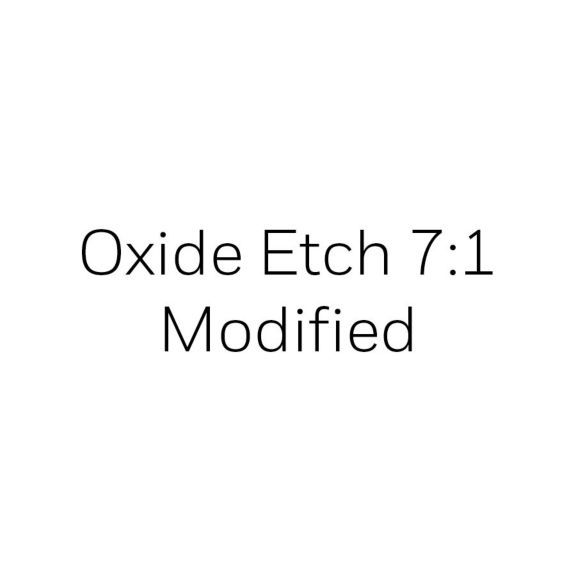Buffered Oxide Etchants
Oxide Etch 7:1 Modified (17662)
VLSI Puranal 250
General Information
- Grade
- VLSI
- Synonyms
- Etchant
Physical Properties
- Boiling Point/Range
- > 100 °C (1,013 hPa)
- Color
- Colorless
- Density
- 1.070 g/cm3 (20 °C)
- Flashpoint
- Not applicable
- Odor
- Stinging
- pH
- Acidic
- Physical Form
- Liquid
- Solubility in Water
- Completely miscible
Safety Information
- Chemical Stability
- Stable under normal conditions.
- Corrosivity
- Corrosive to metals
- Ignition Temperature
- Not applicable
- Incompatible Materials
- Corrosive in contact with metals, Contact with strong acids liberates hydrogen fluoride, Glass and silicate-containing materials are attacked
- Thermal Decomposition
- No decomposition if used as directed.
International Transportation
- Chemical Class
- 8
- Harmonized System Code
- 38249996
- Packing Group
- II
- UN Number
- 3264
General Information
- Grade
- VLSI
- Synonyms
- Etchant
Physical Properties
- Boiling Point/Range
- > 100 °C (1,013 hPa)
- Color
- Colorless
- Density
- 1.070 g/cm3 (20 °C)
- Flashpoint
- Not applicable
- Odor
- Stinging
- pH
- Acidic
- Physical Form
- Liquid
- Solubility in Water
- Completely miscible
Safety Information
- Chemical Stability
- Stable under normal conditions.
- Corrosivity
- Corrosive to metals
- Ignition Temperature
- Not applicable
- Incompatible Materials
- Corrosive in contact with metals, Contact with strong acids liberates hydrogen fluoride, Glass and silicate-containing materials are attacked
- Thermal Decomposition
- No decomposition if used as directed.
International Transportation
- Chemical Class
- 8
- Harmonized System Code
- 38249996
- Packing Group
- II
- UN Number
- 3264
- Synonyms : Etchant
- Grade : VLSI
- Solubility in Water : Completely miscible
- Flashpoint : Not applicable
- Color : Colorless
- Boiling Point/Range : > 100 °C (1,013 hPa)
- Physical Form : Liquid
- Odor : Stinging
- pH : Acidic
- Density : 1.070 g/cm3 (20 °C)
- Chemical Stability : Stable under normal conditions.
- Thermal Decomposition : No decomposition if used as directed.
- Ignition Temperature : Not applicable
- Corrosivity : Corrosive to metals
- Incompatible Materials : Corrosive in contact with metals, Contact with strong acids liberates hydrogen fluoride, Glass and silicate-containing materials are attacked
- Packing Group : II
- Chemical Class : 8
- UN Number : 3264
- Harmonized System Code : 38249996





